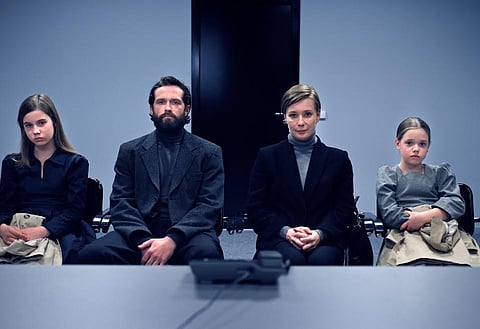

As a refugee drama, Quiet Life begins where the Cannes Un Certain Regard film, The Story of Souleymane, ends—with the denial of asylum by the country that the films’ protagonists have migrated to, in search of a safe, secure, and better life. While The Story of Souleymane focuses on the lead-up to this shattering moment, Quiet Life goes on to explore the cold, galling, thoughtless and inhuman dismissal and its alarming consequences. Most significantly, it brings to light the mysterious and largely unfamiliar Resignation Syndrome that refugee children often get afflicted with. The fear of violence, repression, and indigence back home and uncertainty about the future in a new country makes them shut down and dissociate from reality to go into a comatose state. A defence mechanism of sorts to cope with the unbearable. Greek filmmaker Alexandros Avranas presents the phenomenon in Quiet Life in a contemporary, dystopian, almost Sleeping Beauty-like mode.
The France, Germany, Sweden, Greece, Estonia and Finland co-production had its world premiere on August 29 in Orizzonti (Horizon) section of the ongoing Venice Film Festival.
A Russian couple—Sergei (Grigory Dobrygin) and Natalia (Chulpan Khamatova)—and their two young daughters, Alina (Naomi Lamp) and Katja (Miroslava Pashutina)—flee to Sweden in 2018 after Sergei, a school principal, faces repression and brutal attacks back home for championing pluralism, democracy and freedom of expression. They learn the foreign language, adopt a new way of life and culture; educate the kids in a local school; integrate into the social fabric and even look forward to having new Swedish names—Hilda, Sven, Ingrid—while waiting to have their asylum application cleared by the Migration Board. The moment of reckoning comes when it gets rejected and Katja suddenly slips into a coma. Will they manage to emerge out of this state of hopelessness and despair to be a happy family again?
The film starts off on a chilling note with the Swedish authorities coming in for an inspection of the family’s home and kitchen, sniffing away even at what they are having for tea and dinner. The absurd gets more ludicrous later as an official with a deadpan face and artificial laughter makes Sergei and Natalia practise staying calm and smiling in the face of the tragedy that has struck their daughter. The entire Swedish machinery, institutions, processes and personnel are portrayed as cold, impersonal, and heartless. A deliberate emotional distance and clinical approach underline the presentation of the horrors of the system and the broad, and exaggerated, portrayal of the robotic officials who don’t think twice about manipulating a child and having her break down in their search for the “truth”.
The blue and grey colour palette, the minimal, uncluttered, almost sanitised production design and an austere tone mark the filmmaking. However, the horrific gets rightly horrifying, as this stylised mode makes way for the genuinely emotional moments illuminating the desperation of the family as they fight for the visitation rights to their ailing children, snatched away from them and then go on to create a bubble of comfort in a room in the basement complete with ice creams and favourite cartoons on TV, songs on the car drives and swimming in the pool. All in the hope that this warmth will thaw the glacial state their kids are stuck in and help them awake from the interminable sleep. In a particularly affecting moment, Natalia talks about the home, the garden and the job left behind in Russia, the poignancy heightened by Chulpan Khamatova’s restrained performance as she asserts, “We had a life”. In fact, the other three actors are just as wonderful, especially Grigory with the mix of fear, concern, defiance and dignity defining his personality and Miroslava as Katja with her sad face alone speaking volumes. A family on screen that feels like a real family, in both happiness and despair.